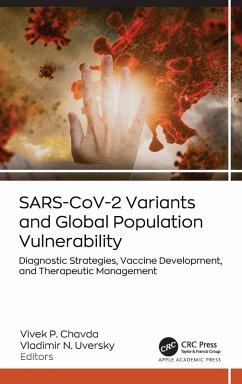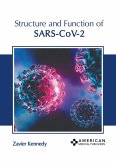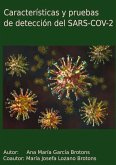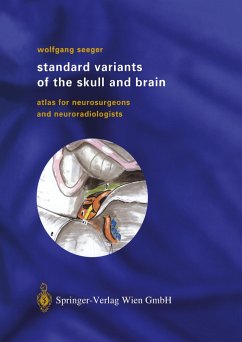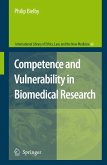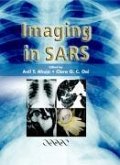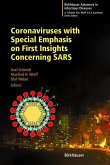SARS-CoV-2 Variants and Global Population Vulnerability
Diagnostic Strategies, Vaccine Development, and Therapeutic Management
Herausgeber: Chavda, Vivek P.; Uversky, Vladimir N.
SARS-CoV-2 Variants and Global Population Vulnerability
Diagnostic Strategies, Vaccine Development, and Therapeutic Management
Herausgeber: Chavda, Vivek P.; Uversky, Vladimir N.
- Gebundenes Buch
- Merkliste
- Auf die Merkliste
- Bewerten Bewerten
- Teilen
- Produkt teilen
- Produkterinnerung
- Produkterinnerung
Details the biology and immunophysiology of SARS-CoV-2 and highlights the global vulnerability of the world population to it. Discusses the diagnostics, vaccine development, and therapeutic management covering zoonotic origin, organization, and transmission of SARS-CoV-2, lifestyle and immunophysiology of the virus, and more.
Andere Kunden interessierten sich auch für
![Structure and Function of Sars-Cov-2 Structure and Function of Sars-Cov-2]() Structure and Function of Sars-Cov-2154,99 €
Structure and Function of Sars-Cov-2154,99 €![Características y pruebas de detección del SARS-COV-2 Características y pruebas de detección del SARS-COV-2]() Ana María García BrotonsCaracterísticas y pruebas de detección del SARS-COV-212,99 €
Ana María García BrotonsCaracterísticas y pruebas de detección del SARS-COV-212,99 €![Standard Variants of the Skull and Brain Standard Variants of the Skull and Brain]() Wolfgang SeegerStandard Variants of the Skull and Brain40,99 €
Wolfgang SeegerStandard Variants of the Skull and Brain40,99 €![Competence and Vulnerability in Biomedical Research Competence and Vulnerability in Biomedical Research]() Philip BielbyCompetence and Vulnerability in Biomedical Research116,99 €
Philip BielbyCompetence and Vulnerability in Biomedical Research116,99 €![Spillover Spillover]() David QuammenSpillover10,99 €
David QuammenSpillover10,99 €![Imaging in Sars Imaging in Sars]() A. T. Ahuja / C. G. C. OoiImaging in Sars119,99 €
A. T. Ahuja / C. G. C. OoiImaging in Sars119,99 €![Coronaviruses with Special Emphasis on First Insights Concerning SARS Coronaviruses with Special Emphasis on First Insights Concerning SARS]() Axel Schmidt / Manfred H. Wolff / Olaf Weber (eds.)Coronaviruses with Special Emphasis on First Insights Concerning SARS81,99 €
Axel Schmidt / Manfred H. Wolff / Olaf Weber (eds.)Coronaviruses with Special Emphasis on First Insights Concerning SARS81,99 €-
-
-
Details the biology and immunophysiology of SARS-CoV-2 and highlights the global vulnerability of the world population to it. Discusses the diagnostics, vaccine development, and therapeutic management covering zoonotic origin, organization, and transmission of SARS-CoV-2, lifestyle and immunophysiology of the virus, and more.
Hinweis: Dieser Artikel kann nur an eine deutsche Lieferadresse ausgeliefert werden.
Hinweis: Dieser Artikel kann nur an eine deutsche Lieferadresse ausgeliefert werden.
Produktdetails
- Produktdetails
- Verlag: Apple Academic Press
- Seitenzahl: 614
- Erscheinungstermin: 5. Juli 2024
- Englisch
- Abmessung: 240mm x 161mm x 37mm
- Gewicht: 1077g
- ISBN-13: 9781774917589
- ISBN-10: 1774917580
- Artikelnr.: 70163790
- Herstellerkennzeichnung
- Libri GmbH
- Europaallee 1
- 36244 Bad Hersfeld
- gpsr@libri.de
- Verlag: Apple Academic Press
- Seitenzahl: 614
- Erscheinungstermin: 5. Juli 2024
- Englisch
- Abmessung: 240mm x 161mm x 37mm
- Gewicht: 1077g
- ISBN-13: 9781774917589
- ISBN-10: 1774917580
- Artikelnr.: 70163790
- Herstellerkennzeichnung
- Libri GmbH
- Europaallee 1
- 36244 Bad Hersfeld
- gpsr@libri.de
Vivek P. Chavda, MPharm, is currently working as an Assistant Professor in the Department of Pharmaceutics and Pharmaceutical Technology at the L. M. College of Pharmacy, Ahmedabad, Gujarat, India. Before joining academia, he served in the biologics industry for almost eight years in research and development with two successful regulatory filings at Lupin Biotech (Pune) and Dr. Reddy's Laboratory (Hyderabad). He has more than 150 national and international publications, nearly 20 book chapters, several books, one patent in progress as well as numerous newsletter articles to his credit. His research interests include development of biologics processes and formulations, medical device development, nano-diagnostics, long-acting parenteral formulations, and nano-vaccines. He earned his BPharm and MPharm degrees (with gold medals) at Gujarat Technological University, Gujarat, India. Vladimir N. Uversky, PhD, DSc, FRSB, FRSC, is a full Professor in the Department of Molecular Biology, University of South Florida, Tampa, Florida, USA. Dr. Uversky works on various aspects of protein intrinsic disorder phenomenon and on analysis of protein folding and misfolding. He has authored over 1150 scientific publications. According to the Thomson Reuters' Web of Science, his work was cited over 66,000 times, and he has an h-index of 126. Dr. Uversky has been included in the prestigious Clarivate List of Highly Cited Researchers(TM) every year from 2014 to 2020. In 2021, he was elected as a Fellow of the Royal Society of Biology and a Fellow of the Royal Society of Chemistry. Over the years, he has delivered more than 240 invited talks at various national and international conferences and invited seminars in various universities and research institutions around the globe. Dr. Uversky has collaborated with more than 12,500 colleagues from more than 2,750 research organizations in 89 countries/territories. He is an editor of a number of scientific journals and has edited several books and book series on protein structure, function, folding, and misfolding. He obtained his PhD in Biophysics from the Moscow Institute of Physics and Technology and DSc in Biophysics from the Institute of Experimental and Theoretical Biophysics, Russian Academy of Sciences.
Foreword by Elrashdy M. Redwan 1. Zoonotic Origin, Genomic Organization, Transmission, and Mutation of SARS
CoV
2 2. SARS
CoV
2 Life Cycle and Immuno
Pathophysiology 3. Conventional and Novel Diagnostics for the Detection of SARS
CoV
2 Variants 4. Biosensors: An Advanced and Sensitive Analytical Technique for the Early Detection of SARS
CoV
2 Variants 5. Global Impact of Delta and Omicron Variants of SARS
CoV
2 6. Drug Repurposing for Covid
19 and Fast Track New Drug Discovery for Emerging SARS
CoV
2 Variants 7. Characterization of SARS
CoV
2 Variants Using Respiratory Organoids and Organs on a Chip (OOACs) 8. Fast
Track Vaccine Development for Covid
19 and Impact of Emerging Variants 9. Nasal Vaccine for the Control of Emerging Variants of SARS
CoV
2 10. Role of Nucleic Acid Vaccines for the Management of Emerging Variants of SARS
CoV
2 11. Role of Monoclonal Antibodies for the Management of Immersing Variant of SARS
CoV
2 12. Dietary Supplements and Nutraceuticals Against Variants of SARS
CoV
2 13. Herbal Remedies for Covid
19 Management 14. Covid
19 and Post
Covid
19 Associated Complications and Their Management 15. SARS
CoV
2 Variants and Global Vulnerability: Diagnostic, Vaccines, and Therapeutic Management 16. Socio
Economic and Environmental Impact of SARS
CoV
2 Variants 17. Nanotechnology
Based Interventions for Covid
19 Management 18. SARS
CoV
2 Variants and Covid
19 Pandemic: Future Perspectives
CoV
2 2. SARS
CoV
2 Life Cycle and Immuno
Pathophysiology 3. Conventional and Novel Diagnostics for the Detection of SARS
CoV
2 Variants 4. Biosensors: An Advanced and Sensitive Analytical Technique for the Early Detection of SARS
CoV
2 Variants 5. Global Impact of Delta and Omicron Variants of SARS
CoV
2 6. Drug Repurposing for Covid
19 and Fast Track New Drug Discovery for Emerging SARS
CoV
2 Variants 7. Characterization of SARS
CoV
2 Variants Using Respiratory Organoids and Organs on a Chip (OOACs) 8. Fast
Track Vaccine Development for Covid
19 and Impact of Emerging Variants 9. Nasal Vaccine for the Control of Emerging Variants of SARS
CoV
2 10. Role of Nucleic Acid Vaccines for the Management of Emerging Variants of SARS
CoV
2 11. Role of Monoclonal Antibodies for the Management of Immersing Variant of SARS
CoV
2 12. Dietary Supplements and Nutraceuticals Against Variants of SARS
CoV
2 13. Herbal Remedies for Covid
19 Management 14. Covid
19 and Post
Covid
19 Associated Complications and Their Management 15. SARS
CoV
2 Variants and Global Vulnerability: Diagnostic, Vaccines, and Therapeutic Management 16. Socio
Economic and Environmental Impact of SARS
CoV
2 Variants 17. Nanotechnology
Based Interventions for Covid
19 Management 18. SARS
CoV
2 Variants and Covid
19 Pandemic: Future Perspectives
Foreword by Elrashdy M. Redwan 1. Zoonotic Origin, Genomic Organization, Transmission, and Mutation of SARS
CoV
2 2. SARS
CoV
2 Life Cycle and Immuno
Pathophysiology 3. Conventional and Novel Diagnostics for the Detection of SARS
CoV
2 Variants 4. Biosensors: An Advanced and Sensitive Analytical Technique for the Early Detection of SARS
CoV
2 Variants 5. Global Impact of Delta and Omicron Variants of SARS
CoV
2 6. Drug Repurposing for Covid
19 and Fast Track New Drug Discovery for Emerging SARS
CoV
2 Variants 7. Characterization of SARS
CoV
2 Variants Using Respiratory Organoids and Organs on a Chip (OOACs) 8. Fast
Track Vaccine Development for Covid
19 and Impact of Emerging Variants 9. Nasal Vaccine for the Control of Emerging Variants of SARS
CoV
2 10. Role of Nucleic Acid Vaccines for the Management of Emerging Variants of SARS
CoV
2 11. Role of Monoclonal Antibodies for the Management of Immersing Variant of SARS
CoV
2 12. Dietary Supplements and Nutraceuticals Against Variants of SARS
CoV
2 13. Herbal Remedies for Covid
19 Management 14. Covid
19 and Post
Covid
19 Associated Complications and Their Management 15. SARS
CoV
2 Variants and Global Vulnerability: Diagnostic, Vaccines, and Therapeutic Management 16. Socio
Economic and Environmental Impact of SARS
CoV
2 Variants 17. Nanotechnology
Based Interventions for Covid
19 Management 18. SARS
CoV
2 Variants and Covid
19 Pandemic: Future Perspectives
CoV
2 2. SARS
CoV
2 Life Cycle and Immuno
Pathophysiology 3. Conventional and Novel Diagnostics for the Detection of SARS
CoV
2 Variants 4. Biosensors: An Advanced and Sensitive Analytical Technique for the Early Detection of SARS
CoV
2 Variants 5. Global Impact of Delta and Omicron Variants of SARS
CoV
2 6. Drug Repurposing for Covid
19 and Fast Track New Drug Discovery for Emerging SARS
CoV
2 Variants 7. Characterization of SARS
CoV
2 Variants Using Respiratory Organoids and Organs on a Chip (OOACs) 8. Fast
Track Vaccine Development for Covid
19 and Impact of Emerging Variants 9. Nasal Vaccine for the Control of Emerging Variants of SARS
CoV
2 10. Role of Nucleic Acid Vaccines for the Management of Emerging Variants of SARS
CoV
2 11. Role of Monoclonal Antibodies for the Management of Immersing Variant of SARS
CoV
2 12. Dietary Supplements and Nutraceuticals Against Variants of SARS
CoV
2 13. Herbal Remedies for Covid
19 Management 14. Covid
19 and Post
Covid
19 Associated Complications and Their Management 15. SARS
CoV
2 Variants and Global Vulnerability: Diagnostic, Vaccines, and Therapeutic Management 16. Socio
Economic and Environmental Impact of SARS
CoV
2 Variants 17. Nanotechnology
Based Interventions for Covid
19 Management 18. SARS
CoV
2 Variants and Covid
19 Pandemic: Future Perspectives

